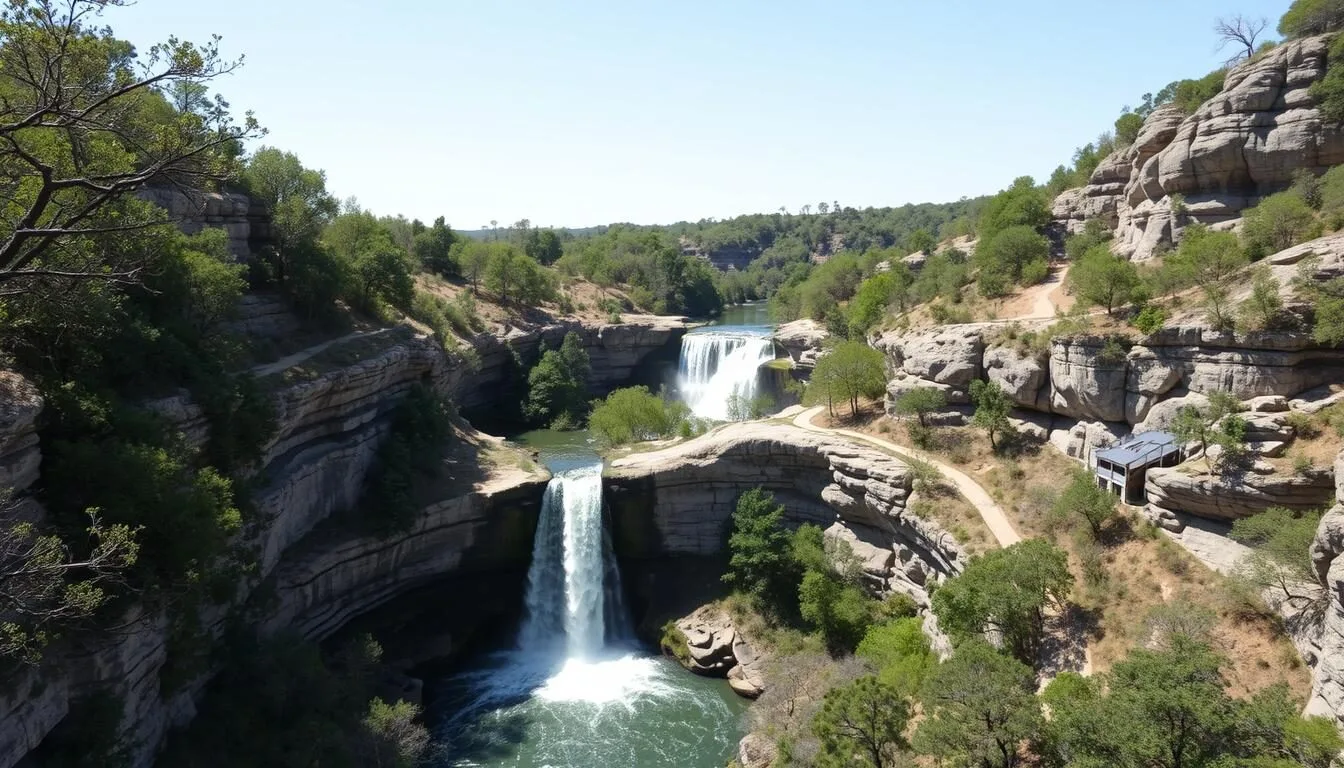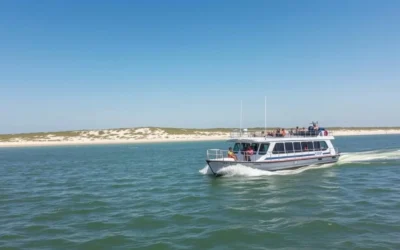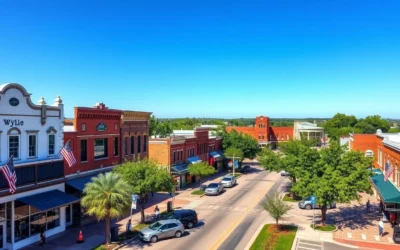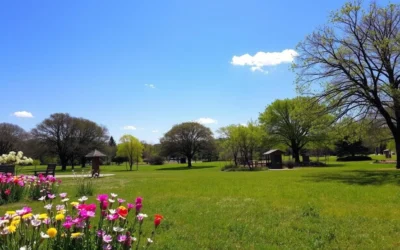Just 13 km (8 miles) from downtown Austin lies a hidden natural gem where limestone ledges create stunning waterfalls and ancient cypress trees have stood witness to over five centuries of Texas history. McKinney Falls State Park, spanning 289 hectares (714 acres), welcomes nearly 300,000 visitors annually to its crystal-clear swimming holes and scenic hiking trails, yet somehow maintains the feeling of a secluded natural retreat.
Getting There & Planning Your Journey
McKinney Falls State Park is conveniently located just 18 km (11 miles) southeast of downtown Austin, making it an easy day trip for both locals and tourists. The park’s accessibility is one of its greatest assets – you can immerse yourself in nature without venturing far from urban amenities.
Ready to Visit McKinney Falls?
Find the best flight deals to Austin-Bergstrom International Airport, just a short 15-minute drive from the park.
Park Entrance & Fees
The park entrance fee is $6 per person for adults (13 and older), while children 12 and under enter free. Texas State Parks Pass holders also get free entry. During peak seasons (summer weekends and holidays), the park often reaches capacity early, so reservations are highly recommended.
You can make day-use reservations up to 30 days in advance through the Texas Parks and Wildlife Department website or by calling (512) 389-8900. The park is open daily from 8:00 AM to 10:00 PM.
Best Time to Visit & Weather Tips
McKinney Falls State Park offers unique experiences year-round, but timing your visit can significantly enhance your experience.
Seasonal Highlights
Spring (March-May)
The ideal season with comfortable temperatures ranging from 18-29°C (65-85°F). Wildflowers bloom throughout the park, and the waterfalls flow vigorously after spring rains. This is perfect for photography and hiking.
Summer (June-August)
Hot and busy with temperatures often exceeding 35°C (95°F). The swimming holes at Upper and Lower Falls become essential refreshment spots. Visit early morning or evening to avoid crowds and peak heat.
Fall (September-November)
Pleasant temperatures return, ranging from 15-26°C (60-80°F). The park is less crowded, and fall colors begin to appear in late October. Water levels may be lower unless there’s been recent rainfall.
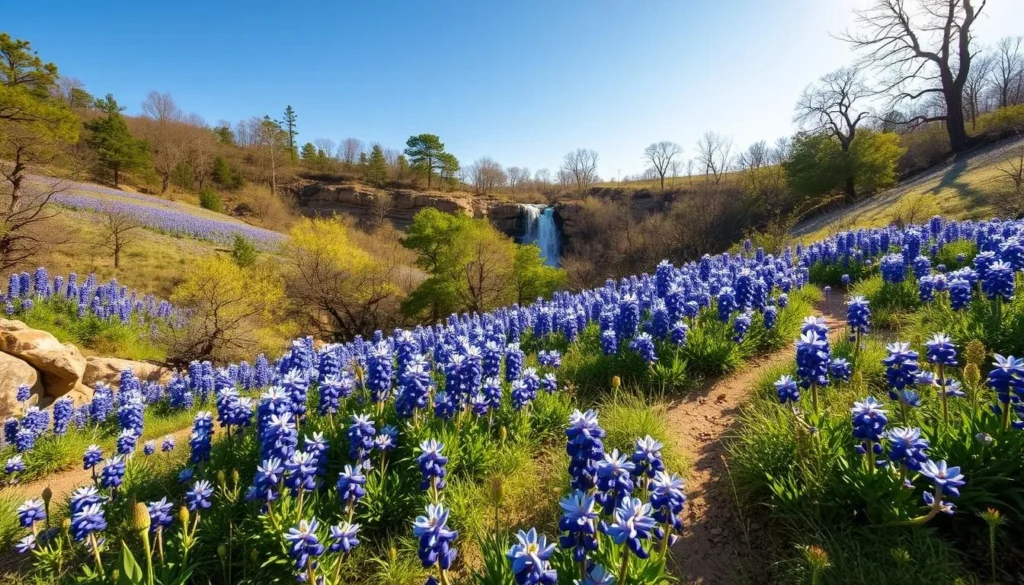
Winter (December-February) brings mild temperatures between 7-18°C (45-65°F) and the lowest visitor numbers. While swimming isn’t ideal, the peaceful trails and occasional foggy mornings create a serene atmosphere perfect for photography and wildlife spotting.
Weather Alert: Central Texas is prone to flash flooding, especially in spring. Always check weather forecasts and park conditions before your visit, as trails and swimming areas may close after heavy rainfall.
Top Things to Do at McKinney Falls State Park
From refreshing swims to scenic hikes, McKinney Falls offers diverse activities for nature lovers of all ages. Here are the must-do experiences during your visit:
Swimming at the Falls
The park’s crown jewels are its two limestone waterfalls, each creating natural swimming areas that provide welcome relief during hot Texas days.
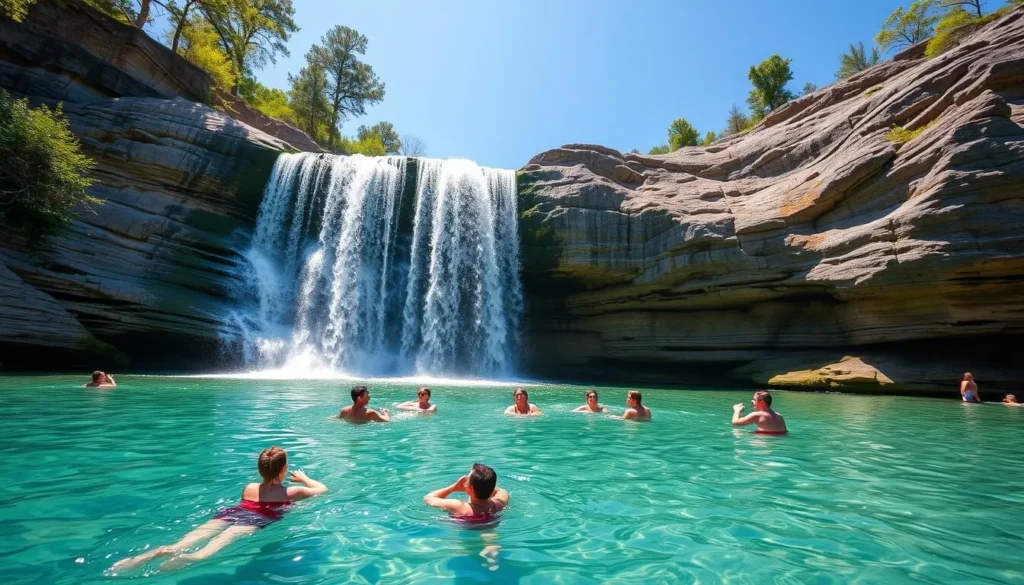
Upper Falls
The more accessible and family-friendly of the two swimming holes, located near the main parking area. Here, Onion Creek cascades over smooth limestone ledges, creating a series of small pools perfect for wading and swimming. The limestone shelf extends across the creek, allowing visitors to walk across when water levels are low.
Lower Falls
A bit more secluded and typically less crowded, reached via a short hike. The swimming area is larger and deeper, with impressive limestone formations. The water plunges about 3 meters (10 feet) over the edge, creating a more dramatic waterfall effect than at Upper Falls.
Swimming Tips: Water shoes are highly recommended as the limestone can be slippery and sharp. Swimming is not permitted during high water conditions. No lifeguards are on duty, so swim at your own risk and supervise children closely.
Hiking Trails
With over 14.5 km (9 miles) of trails ranging from easy paved paths to more challenging rocky terrain, McKinney Falls State Park offers hiking options for all skill levels.
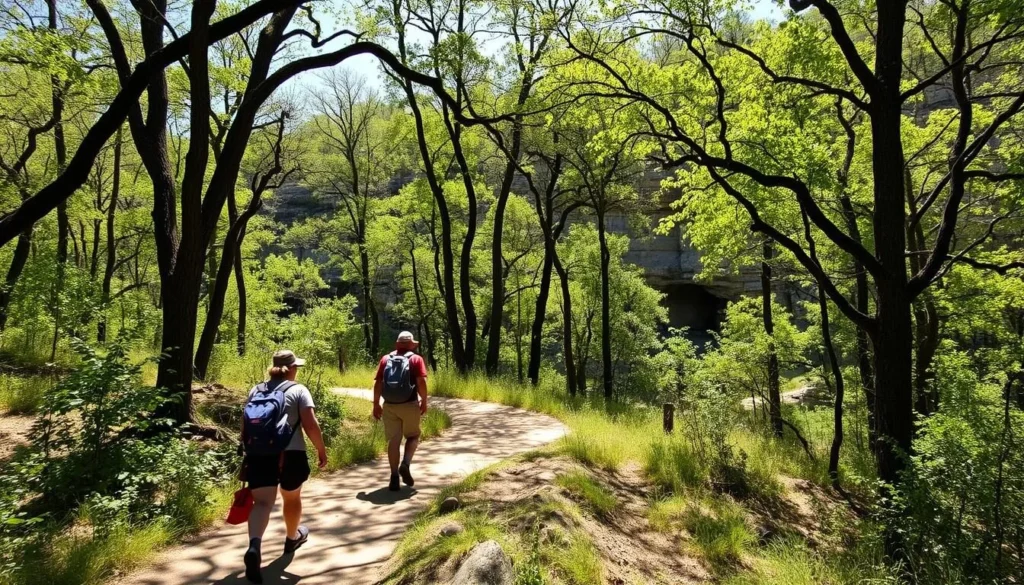
| Trail Name | Distance | Difficulty | Highlights |
| Onion Creek Hike & Bike Trail | 5.3 km (3.3 mi) loop | Easy | Paved trail along Onion Creek, great for families and cyclists |
| Homestead Trail | 5.0 km (3.1 mi) loop | Moderate | Historic McKinney homestead ruins, gristmill remains |
| Rock Shelter Trail | 1.1 km (0.7 mi) loop | Easy | “Old Baldy” 500-year-old cypress tree, limestone formations |
| Williamson Creek Overlook Trail | 1.1 km (0.7 mi) loop | Moderate | Scenic views of Williamson Creek, diverse vegetation |
| Flint Rock Loop Trail | 2.2 km (1.4 mi) loop | Moderate | Wooded areas, rocky terrain, connects to other trails |
| Picnic Trail | 0.8 km (0.5 mi) one-way | Easy | Connects Upper Falls to picnic area, bouldering rocks |
Explore McKinney Falls with Local Experts
Discover hidden gems and learn about the park’s history with guided tours from Austin’s top outdoor guides.
Fishing & Wildlife Watching
McKinney Falls State Park offers excellent opportunities for anglers and wildlife enthusiasts alike, with Onion Creek providing habitat for various fish species and the surrounding landscape supporting diverse Texas wildlife.
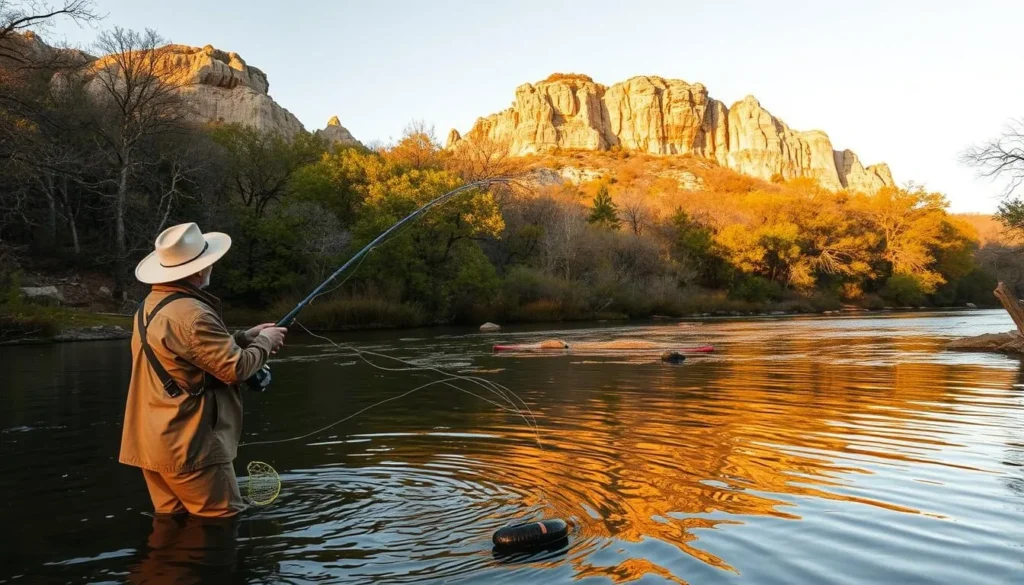
Fishing Opportunities
No fishing license is required when fishing from shore within Texas state parks. Onion Creek is home to several fish species including:
- Largemouth bass
- Sunfish (bluegill and green sunfish)
- Catfish (channel and blue)
- Rio Grande cichlid (found only in Central Texas streams)
The best fishing spots include the deeper pools below Lower Falls and the calmer waters near the Rock Shelter area. Early mornings and evenings typically yield the best results, especially during summer months.
Wildlife Watching
The park is home to numerous wildlife species that can be spotted while hiking or sitting quietly in natural areas. Common sightings include:
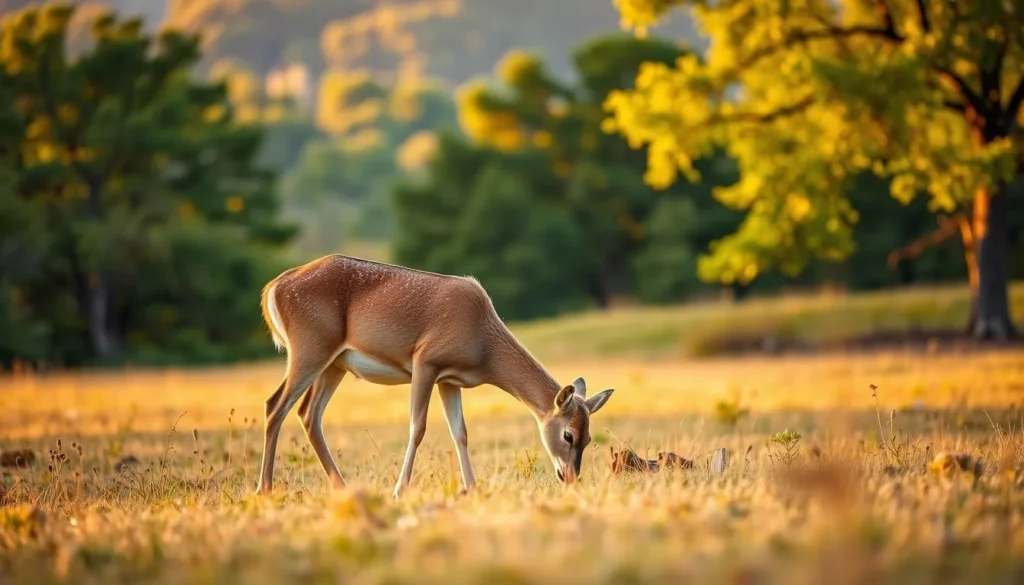
Mammals
- White-tailed deer
- Raccoons
- Armadillos
- Eastern fox squirrels
Birds
- Great blue herons
- Painted buntings (spring/summer)
- Cardinals
- Various woodpeckers
Bring binoculars and a field guide to enhance your wildlife watching experience. Early morning and dusk are prime times for animal activity. The Onion Creek Trail and quieter sections of the Homestead Trail offer excellent wildlife viewing opportunities.
Historical Sites & Cultural Significance
Beyond its natural beauty, McKinney Falls State Park preserves important pieces of Texas history, from prehistoric indigenous settlements to early pioneer homesteads.
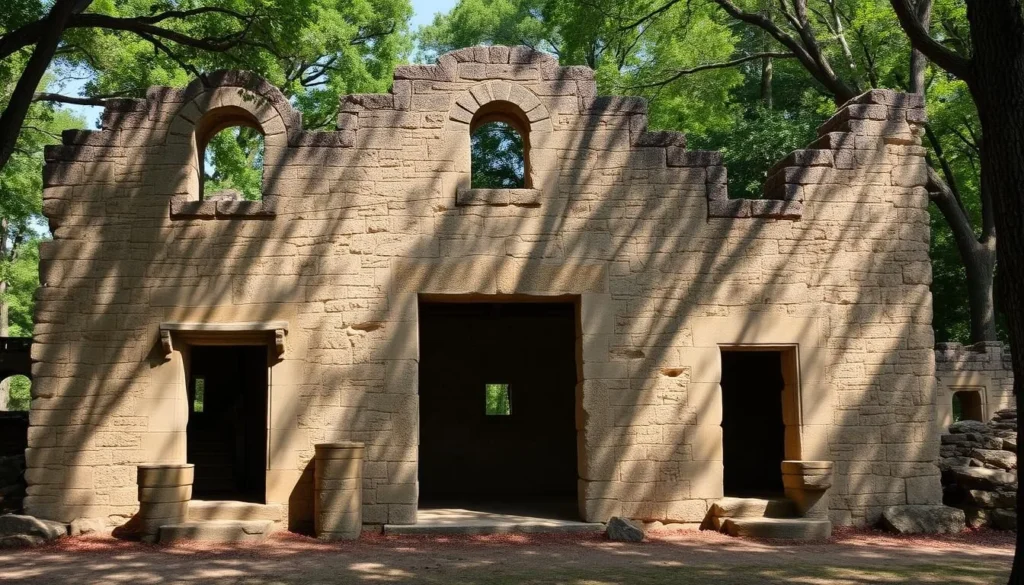
McKinney Homestead
The park is named after Thomas F. McKinney, one of Stephen F. Austin’s original 300 colonists and a significant figure in early Texas history. His homestead, built in the 1850s from limestone quarried on the property, now stands as a preserved ruin accessible via the Homestead Trail.
Nearby, you can also see the remains of McKinney’s horse trainer’s cabin and the gristmill he established in 1852. The mill used waterpower from Onion Creek to grind corn and wheat but was largely destroyed by a flood in the late 19th century.
“Old Baldy” Cypress Tree
One of the park’s most remarkable features is “Old Baldy,” a bald cypress tree estimated to be over 500 years old. Standing 31 meters (103 feet) tall, this living monument was already a century old when European explorers first arrived in the region. You can find this impressive tree along the Rock Shelter Trail.
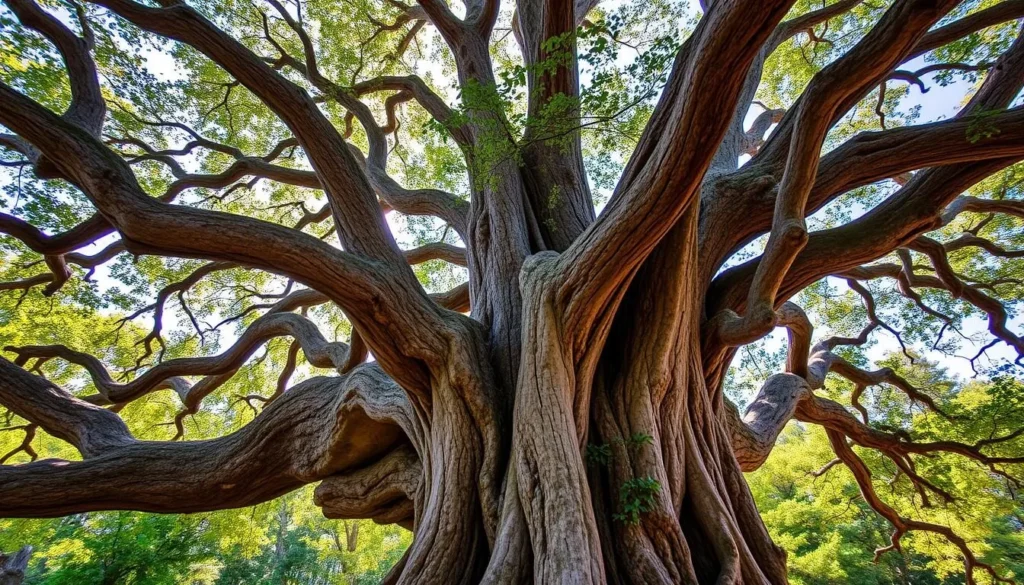
El Camino Real
The limestone crossings at both Upper and Lower Falls were once part of El Camino Real de los Tejas (The Royal Road), a historic route that connected Mexico City to Natchitoches, Louisiana. Spanish missionaries, settlers, and traders used this route beginning in the late 17th century.
“The limestone ledges that create our beautiful waterfalls today once served as natural bridges for travelers along El Camino Real, one of the oldest travel routes in North America.”
Where to Stay
Whether you prefer sleeping under the stars or retreating to comfortable accommodations after a day of outdoor adventure, there are plenty of options for staying at or near McKinney Falls State Park.
Camping in the Park
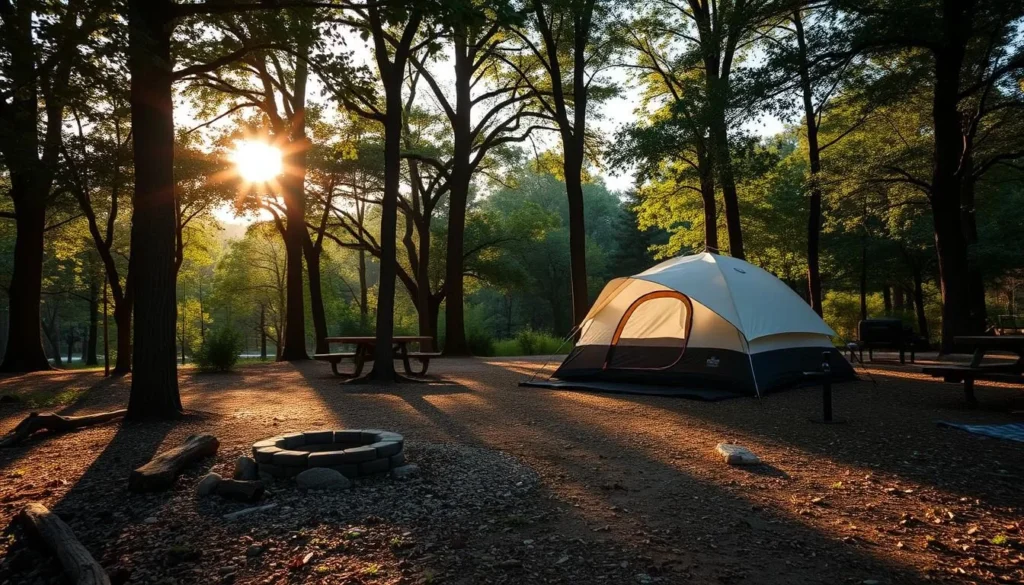
McKinney Falls offers 81 campsites with water and electrical hookups (30/50 amp), accommodating both tents and RVs. Each site includes:
- Picnic table
- Fire ring with grill
- Lantern post
- Access to restrooms with hot showers
Campsite fees range from $20-$24 per night, and reservations can be made up to 5 months in advance through the Texas Parks and Wildlife Department website. Sites are often fully booked during weekends and holidays, so plan accordingly.
Find Your Perfect Stay
From nearby hotels to vacation rentals, find accommodations that suit your style and budget.
Nearby Accommodations
If camping isn’t your style, numerous lodging options are available within a short drive of the park:
Budget Options
- Several chain hotels along I-35, about 15 minutes from the park
- Budget-friendly motels in Southeast Austin
Mid-Range & Luxury
- Boutique hotels in downtown Austin (20-25 minute drive)
- Vacation rentals in nearby neighborhoods
- Bed and breakfasts in South Austin
For those seeking a unique experience, consider glamping options in the Hill Country or staying at one of the many distinctive accommodations that embody Austin’s “Keep It Weird” spirit, all within a 30-minute drive of the park.
Practical Travel Tips
Make the most of your visit to McKinney Falls State Park with these essential tips from experienced visitors:
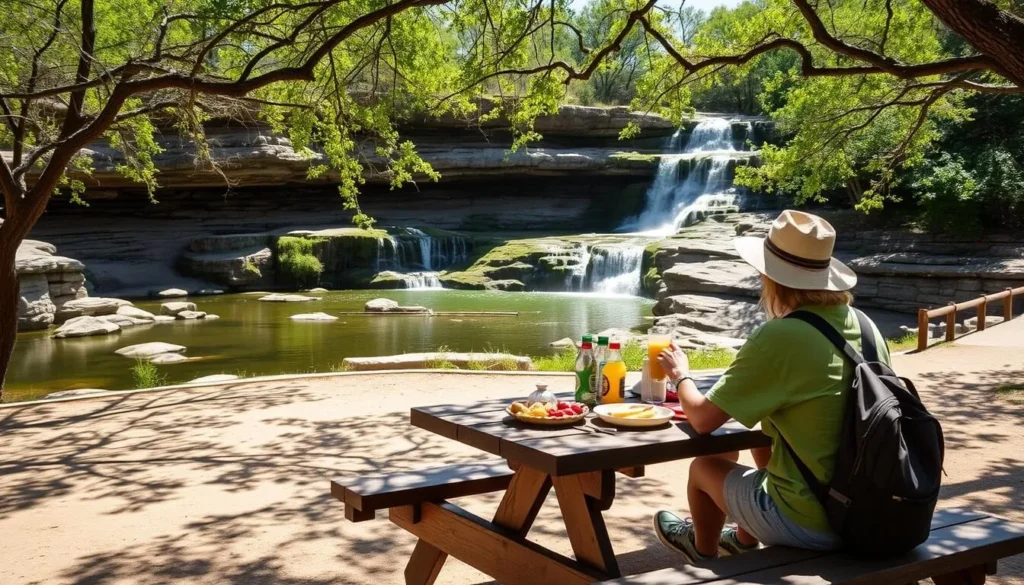
What to Pack
- Water shoes – Essential for swimming areas where limestone can be slippery and sharp
- Plenty of water – At least 1 liter per person for every 2 hours of activity
- Sun protection – Hat, sunscreen, and sunglasses, especially in summer
- Insect repellent – Particularly important during warmer months
- Binoculars – For wildlife watching and bird spotting
- Proper footwear – Sturdy hiking shoes for trails, especially after rain
Need Transportation?
Rent a car to easily access McKinney Falls State Park and explore other nearby attractions at your own pace.
Park Etiquette & Safety
Leave No Trace
- Pack out all trash
- Stay on designated trails
- Leave natural features undisturbed
- Keep noise levels reasonable
Safety Precautions
- Check water conditions before swimming
- Be aware of flash flood risks after rain
- Watch for slippery limestone surfaces
- Bring sufficient water to prevent dehydration
Wildlife Safety: While generally not aggressive, be aware that the park is home to various snakes, including some venomous species. Stay on trails, watch where you step, and never reach into rock crevices or dense vegetation without looking first.
Accessibility Information
McKinney Falls State Park offers several accessible features:
- Paved Onion Creek Hike & Bike Trail suitable for wheelchairs and strollers
- Accessible restrooms at the visitor center and campgrounds
- Several accessible campsites with paved parking and amenities
- Accessible fishing areas along portions of Onion Creek
The visitor center features exhibits on the park’s natural and cultural history and is fully accessible. Staff can provide additional information about trail conditions and accessibility options.
Plan Your McKinney Falls Adventure
McKinney Falls State Park offers a perfect blend of natural beauty, outdoor recreation, and historical significance just minutes from downtown Austin. Whether you’re swimming beneath limestone waterfalls, hiking scenic trails, or exploring historic ruins, this urban oasis provides a refreshing escape from city life without requiring a long journey.
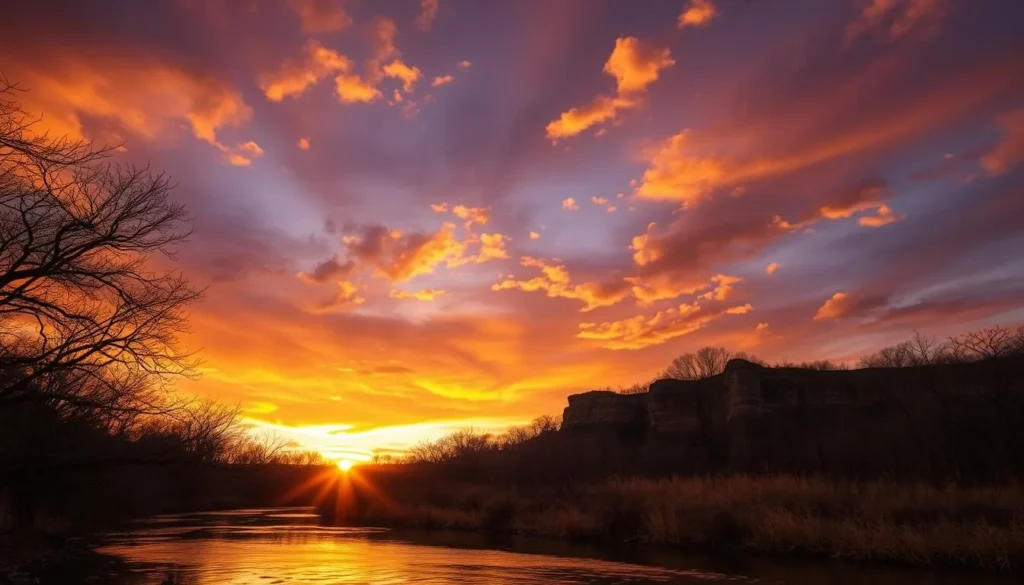
With its accessibility, diverse activities, and year-round appeal, McKinney Falls State Park deserves a spot on any Texas travel itinerary. Remember to make reservations in advance, especially during peak seasons, to ensure your access to this natural gem in the heart of Texas.
Ready for Your McKinney Falls Adventure?
Start planning your perfect outdoor getaway with these essential travel resources.
The above is subject to change.
Check back often to TRAVEL.COM for the latest travel tips and deals.
